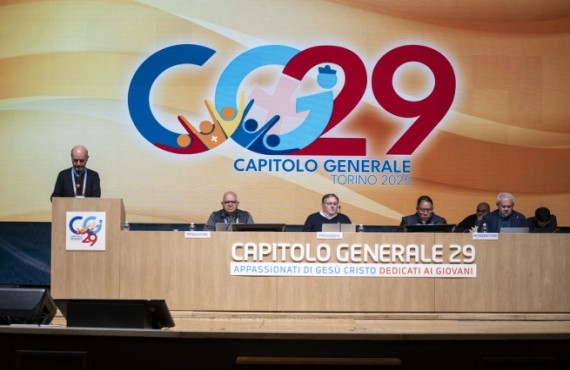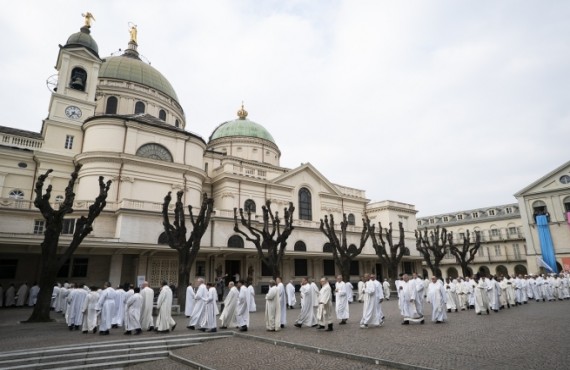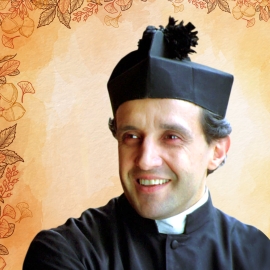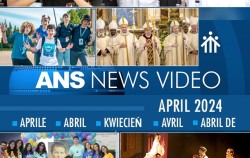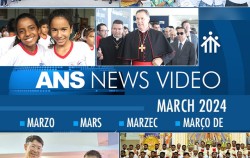NOTÍCIAS
(ANS – Roma) – Num mundo que corre cada vez mais velozmente, onde os jovens são frequentemente vítimas de pressão, desorientados pela confusão geral, negligenciados..., uma força humilde continua a arder de forma constante na flâmula acesa pela primeira vez em Valdocco, Turim, e que ora flameja com determinação em Luzon, nas Filipinas, através da chama da Inspetoria Salesiana São João Bosco, do Norte das Filipinas (FIN).
(ANS – Los Angeles-CA) – O dia 12 de abril de 2025 não foi apenas mais um sábado. Nessa data, o Centro Juvenil da FS em Los Angeles se tornou o coração de um movimento: mais de 100 jovens de toda a cidade se reuniram para falar e ser ouvidos. O tema era claro: "Nós somos o presente". Desde o primeiro momento, ficou claro que não se tratava somente de uma conferência mas de uma declaração, quase de um manifesto.
(ANS – Roma) - Para aqueles que não participaram diretamente do recentemente concluído Capítulo Geral 29, da Congregação Salesiana, uma das características talvez menos conhecidas foi a presença constante e muito ativa do P. Pascual Chávez Villanueva, Reitor-Mor Emérito.
GALERIA DE FOTOS
ENTREVISTAS
-
Itália – CG29, P. Attard: "Se ouvirmos os jovens do mundo, o método de Dom Bosco será sempre atual"
(ANS - Turim) - Durante o longo ministério do P. Fábio Attard, o novo Reitor-Mor, salesiano há 45 anos e sacerdote desde 1987, entre o trabalho pastoral e a pesquisa acadêmica, há a paixão pelos jovens. Após retornar da Tunísia em 1991, onde estabeleceu a presença salesiana (e aprendeu árabe), retornou a Malta em 1992 como Diretor da Escola salesiana e do Oratório.
EDITORIAL
-
RMG – Dom Bosco – “Santo Fascinante”
(ANS – Roma) - Dom Bosco é talvez o santo mais extraordinário e fascinante que a história produziu. A humilde obra que iniciou na Itália para o bem de seus jovens pobres e abandonados produziu resultados surpreendentes. Hoje são quase 14.000 os Salesianos que trabalham em 136 países; e mais de 200.000 os membros que pertencem aos 32 Grupos da Família Salesiana, e compartilham o carisma de Dom Bosco pelos jovens necessitados.
EVENTOS
-
Malta – Face a face com o Homem do Sudário: no ‘Teatru Salesjan’ de Malta, um encontro que transcende o tempo
(ANS - Sliema) – A peça «Face to Face: Encountering the Man of the Shroud» (Frente a frente com o Homem do Sudário), que ocorre no ‘Teatru Salesjan’, de Sliema, em Malta, estreou no último domingo, 13, e irá até o dia 18 de abril. O notável evento, planejado para a Semana Santa, proporciona a rara oportunidade de ver uma réplica em tamanho real do Santo Sudário, de Turim. Uma imagem silenciosa, mas profundamente tocante, que instigou Fé, admiração e enigma, ao longo dos séculos. Mas isso vai além de uma simples exposição. É uma... peregrinação do coração.
APROFUNDAMENTO
-
Estados Unidos – Dia Internacional das Crianças de Rua: ‘Salesian Missions’ destaca programas que apoiam e capacitam jovens
(ANS – New Rochelle) – A Procuradoria Missionária Salesiana de New Rochelle, EUA, se uniu a organizações humanitárias e internacionais para, no Dia Internacional das Crianças de Rua, chamar a atenção para a situação de crianças e jovens sem-teto. O Dia oferece uma oportunidade para que milhões de crianças de rua em vários países façam suas vozes ouvidas e garantam que seus direitos não sejam ignorados.
MENSAGENS DO REITOR-MOR
-
Com Dom Bosco. Sempre
A MENSAGEM DO VIGÁRIO DO REITOR-MOR, Pe. Stefano Martoglio
Não é indiferente celebrar um Capítulo Geral num lugar ou noutro. Certamente, em Valdocco, no “berço do carisma”, temos a oportunidade de redescobrir a génese da nossa história e reencontrar originalidade que constitui o coração da nossa identidade de consagrados e apóstolos dos jovens.


















